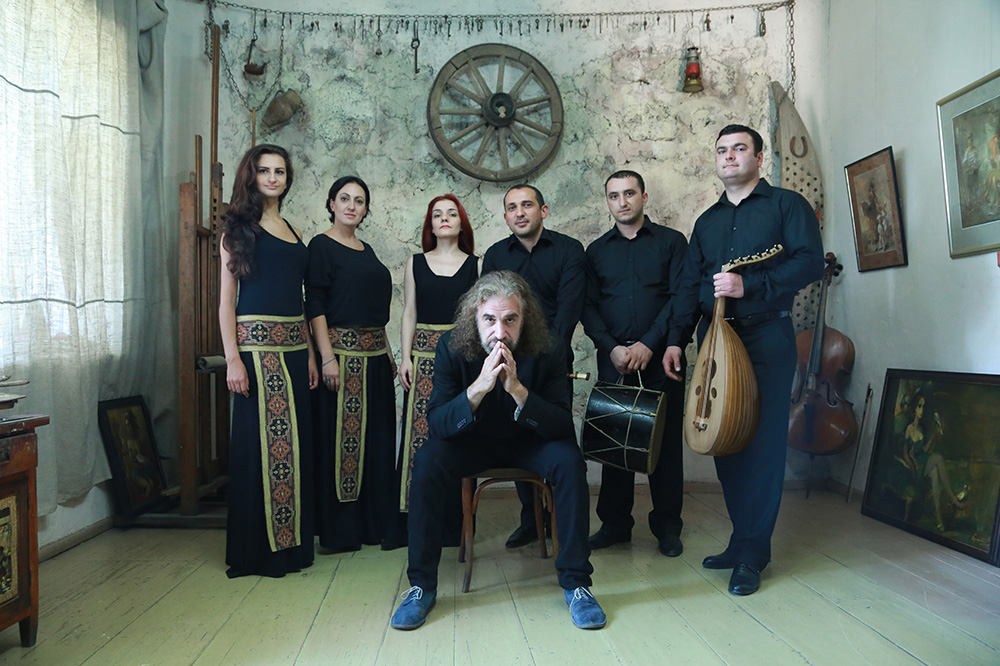
Music by John Hodian
Texts by Mkrtich Naghash (15th century) and Kostandin Erznkaci (13th century)
Meditation on Greed
If in This World by Sin You Wander
Lamentations on the Death of a Child
Woe to Those That Keep a Grudge
INTERMISSION
Another Answer
The Work of Darkness
Lamentations for the Dead
Described by Tigran Mansurian as "the sound of ancient Armenia reimagined for the 21st century", The Naghash Ensemble's music combines the earthy spirituality of Armenian folk song, new classical music, contemporary post-minimalism, and the energy of jazz and rock.
Written by Armenian-American composer John Hodian and based on sacred texts by the medieval Armenian mystic poet and priest, Mkrtich Naghash, The Naghash Ensemble's "Songs of Exile" is a profound rumination on man's relationship to God from the perspective of a monk forced to live in exile for many years. The music has been hailed as "a moment of grace and meditation" by Rolling Stone and "an enchanting elixir of sounds based on new Armenian folk and centuries-old poetry" by KEXP.
Featuring some of Armenia's finest musicians and singers, The Naghash Ensemble has been touring throughout Europe for the past eight years. Their 2014 CD, "Songs of Exile," was the first of a projected three-volume set. The second CD, "Songs of Exile, Volume II: Credos & Convictions," followed in 2016. The third and final volume "Songs of Exile: Lamentations & Benedictions" was released in the fall of 2019, followed by a live CD in 2021.
The ensemble is currently presenting their North American debut tour with concerts in Los Angeles, San Francisco, Lone Tree, Ann Arbor, Detroit, New York, Montreal, Albuquerque, Santa Fe, Washington D.C., and tonight's performance in Fort Collins.
In addition to "Songs of Exile," today's program will feature excerpts from "Songs of Wisdom," a collection of new works based on texts by the 13th-century poet Kostandin Erznkaci.
"Part folk music, part classical, and profoundly moving. Unmistakably Armenian, but out of this world" – Armenisch-Deutsche Korrespondenz
Balm for a Tumultuous Age
By Dr. Michael Bedrosian Pifer
What can one say to comfort a bereaved parent or make sense of the death of a young person? At a time when words might understandably fail many, the medieval bishop Mkrtich Naghash turned to poetry.
Naghash had seen more than his share of death and dispersion. He had lived through one of the worst experiences that a person might endure — the death of his son, who fell victim to the warfare that plagued his city. To press salt into these wounds, battles and skirmishes only gave way to a more insidious killer — pandemic disease — that forced the living and the dead to adopt uncomfortably close quarters.
Naghash responded to the death of his son and the loss of so many other youths during his lifetime, in part by composing a lament that is brilliantly set to music by John Hodian and included in tonight's performance. In this poem, Naghash encourages us to make provisions for our departed loved ones through prayer. The poem, in other words, reflects a call to action — a call to increase one's participation in the spiritual life of the community, centered in Holy Mass. Likewise, as Naghash stresses in his many poems, we must not forget our obligations to one another.
This message was a balm for a tumultuous age. Naghash was the bishop of Amida (present-day Diyarbakır) during the 15th century, a period when Armenians lived in dispersion far beyond their ancestral lands. To weather the loss of statehood, which vanished when the last Armenian kingdom fell in 1375, Armenians were forced to adapt to a rapidly changing world. Fortunately, Naghash served as an exemplary model in this regard. The primary account of his life, written by one of Naghash's contemporaries, depicts him as an adept and cunning figure. He was honored not only by Armenians, but also by Turks, Arabs, Jews, Kurds, and many other peoples. To some extent, the diversity of his world is encoded right in Naghash's very name, which means "painter" (naqqāsh) in Persian, as he was widely famed for his illumination of manuscripts.
It can be hard for audiences today to understand the oversized role Naghash's poetry served in the lives of pre-modern audiences. In the modern Western world, poetry is often treated as a largely aesthetic undertaking, one with low stakes for society at large. But in Naghash's world, poetry was often an explicitly social art form. It is not uncommon when perusing the extant manuscripts to find Naghash's poems in a loose form of musical notation (known as khaz in Armenian). In other words, his poems were chanted or sung aloud, perhaps with musical accompaniment. Poetry was not only for the highly literate but could also be enjoyed by a broader listening audience.
Poetry, moreover, was not used for entertainment purposes alone. It could also commemorate and help one to survive major life events. Tellingly, in one manuscript of the ritual book of the Armenian church, we find a copy of Naghash's lamentations on the death of a child. This ritual book commands the reader (in this case, likely a priest) to recite Naghash's poem before performing the funerary rites. His words quite literally guided audiences through the grieving process, gently encouraging the community to come together and heal itself — even at moments of heartbreaking loss.
For this reason, it's not surprising that Naghash's poems found broad reception far beyond his hometown. Most notably, even the first printed book of Armenian poetry, published in Venice in 1513, contains many of Naghash's poems. Armenians living around the pre-modern globe clearly found something resonant in his words, something that spoke not only to the particularities of the Armenian condition, but also to a more broadly human experience.
The Naghash Ensemble brings to life this tradition of addressing community, on a global scale, through the performance of poetry in fresh ways. Rather than paint a nostalgic and static picture of Armenian history, the ensemble does something far more daring: it acknowledges that these poems are most powerful when given a voice that still matters in the present. Although different in context and presentation, this approach is arguably what made Naghash's poetry so vital in the first place. The past comes alive in these performances, though not to haunt us. Rather, the voice of Naghash calls on us to rely on each other to reaffirm the ties that bind individuals into communities, even in uncertain times of our own.

